The Last Game: creating an animated World Cup epic
Find out how Nike's agency Wieden+Kennedy and Passion Pictures created the most talked-about short of the summer.
On behalf of sports brand Nike, ad agency Wieden+Kennedy commissioned Passion to write, develop and create a five-minute, fully animated film depicting a cast of star Nike athletes engaging in the ultimate game of football to save the sport from clones.
When we were asked to pitch on this project, Wieden+Kennedy sent us an outline of a story that you could distil down to this: an evil scientist invents clones, clones take over football, a select team challenges the clones and you have this clones versus players play-off. It came directly from W+K executive creative directors Alberto Ponte and Ryan O'Rourke, amazingly talented creative guys who happen to be super senior. Even though they sit on top of Nike's advertising globally, this was very much their baby.
We started thinking about the team we could put together to work on it. Director Jon Saunders wrote a story that we accompanied with a 2D, illustrated athlete line-up. That was well received and on the strength of it we were able to get into animation tests very quickly. One of them, done with a prototype caricature of Zlatan Ibrahimovic, just sang.
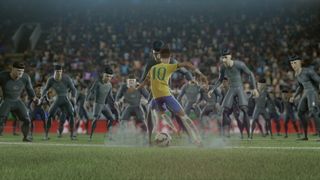
The test showed Zlatan doing a few tricks, but it did more than that: it captured his personality. He doesn't look a million miles away from how he looks in the final film, but this was very much a first draft. He moved really well, showed skill, character, and it really captured W+K's imagination – we got the job. Then we began the writing process in earnest and as well as being the production company, we formed a unique relationship with W+K, where we essentially functioned as another creative team.
Our credentials as a creative shop, as storytellers, as purveyors of entertainment across different media got us in the door, but it was the team we put forward for this collaboration that really put W+K at ease – or as much ease as possible given this was its flagship summer spot for one of its biggest clients in a technique Nike was unfamiliar with. Our biggest challenges were getting the character design and the story right.
The Last Game director, Jon Saunders, walks through the project from start to finish:
01. The treatment
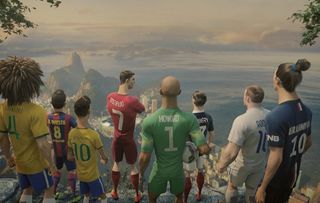
Our treatment hit a few key notes. We wanted the characters to be charming, both in terms of looks and animation; we wanted the world to be grittier and more detailed than your average 3D film, and we wanted the cinematography to be based on a live-action approach.
02. Writing the script
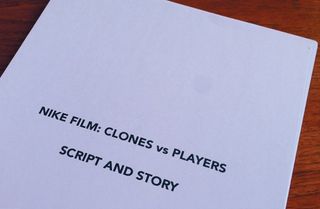
The script turned out to be a bit of a jigsaw puzzle. We knew it needed to be about safety versus risk with a cast of star athletes playing against clone counterparts. We had just five minutes to tell a story (our first script was 15 minutes long) and it took us three months to get it right.
03. Deciding on a look for the film
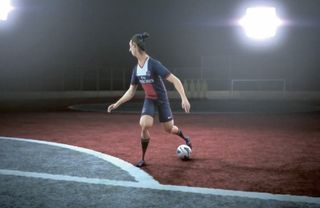
We knew right from the beginning that we didn't want to use motion capture. Hand-keyed animation has a tangible charm that this film needed. When we were pitching for the job an animation test by Conor Ryan really set the tone for how we wanted the characters to move.
04. Character development
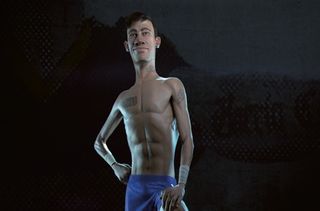
Character design was perhaps our greatest challenge as we had to recognisably caricature a number of star athletes. These caricatures would be met with high expectations from the brand, the agency, ourselves, the viewing public, and of course the star players themselves.
05. Storyboarding and choreography
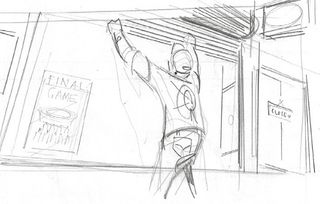
I worked closely with the brilliant storyboard artist Brendan Houghton to understand and pre-plan every sequence. The end game, in particular, required loads of choreography. We were still very open to discovering new angles in pre-visualisation when we had 3D environments to play in.
06. Cinematography
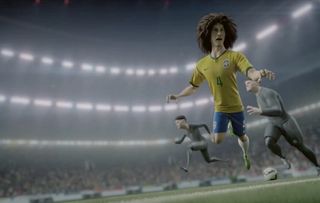
We wanted the cinematography to range from being solemn and intimate, to massive adventure-epic. The end game alone is shot from various heightened viewpoints (including pitch side, POV on the pitch and crane shots) to give shots you'd never see in a real match or computer game.
07. Signature moves
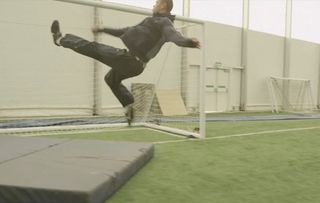
We watched hundreds of video clips analysing individual players' specific moves. We also shot bespoke live-action sequences with pro players for reference and even acted out and filmed moves in the studio with the animators to work out how the players did their tricks.
08. Animating it all
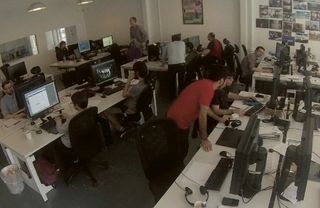
The animation crew at Passion's studio fluctuated in number throughout the course of the whole seven-month project, but it was 25-strong during the particularly intense 12-week period during which we produced all the animated sequences for the final film.
09. Final delivery
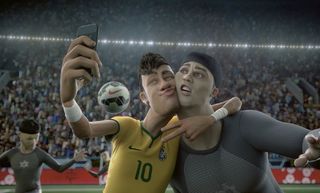
After months of hard work and an unprecedented collaborative process involving over 300 people in total, we finally showed the finished film to Wieden+Kennedy and Nike. It gained around 140 million views via Nike's official online channels alone in the first two weeks after launch.
Words: Ryan Goodwin-Smith and Jon Saunders
This article originally appeared in Computer Arts issue 230.

Thank you for reading 5 articles this month* Join now for unlimited access
Enjoy your first month for just £1 / $1 / €1
*Read 5 free articles per month without a subscription

Join now for unlimited access
Try first month for just £1 / $1 / €1
Get the Creative Bloq Newsletter
Daily design news, reviews, how-tos and more, as picked by the editors.
The Creative Bloq team is made up of a group of design fans, and has changed and evolved since Creative Bloq began back in 2012. The current website team consists of eight full-time members of staff: Editor Georgia Coggan, Deputy Editor Rosie Hilder, Ecommerce Editor Beren Neale, Senior News Editor Daniel Piper, Editor, Digital Art and 3D Ian Dean, Tech Reviews Editor Erlingur Einarsson and Ecommerce Writer Beth Nicholls and Staff Writer Natalie Fear, as well as a roster of freelancers from around the world. The 3D World and ImagineFX magazine teams also pitch in, ensuring that content from 3D World and ImagineFX is represented on Creative Bloq.
